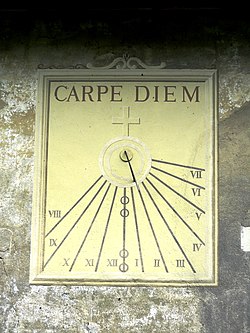Carpe diem
Appearance

Carpe diem is a famous phrase from one of the poems of Horace. It means "seize the day" in Latin.
What it means
[change | change source]Especially during the Baroque era, the phrase was important. In the 17th century there was the Thirty Years' war, which lasted roughly from 1618 to 1648. For the people of the time, death was present almost everywhere. To compensate for that there were the concepts of Carpe diem (There is little time left, use it as best you can), Vanitas (Vanity; things are not what they seem), and Memento mori (Remember you will die).
The poem is originally from Odes 1.11. It is given in Latin and English below.
The poem in Latin and English
[change | change source]| Tu ne quaesieris, scire nefas, quem mihi, quem tibi | Ask not — it's forbidden to know — |
| finem di dederint, Leuconoe, nec Babylonios | what end the gods will give us. Don't play with Babylonian |
| temptaris numeros. ut melius, quidquid erit, pati. | fortune-telling either. Better just deal with whatever comes your way. |
| seu pluris hiemes seu tribuit Iuppiter ultimam, | Whether you will see several more winters or whether the last one Jupiter gives you is |
| quae nunc oppositis debilitat pumicibus mare | the one even now pelting the rocks on the shore with the waves |
| Tyrrhenum: sapias, vina liques et spatio brevi | of the Tyrrhenian sea — be smart, drink your wine. Life is short. |
| spem longam reseces. dum loquimur, fugerit invida | Even as we speak, envious time |
| aetas: carpe diem quam minimum credula postero. | has slipped away. Seize the day, trust not the future. |
Better translation
[change | change source]A better translation of the phrase would probably be pluck the day (as a fruit might be plucked from a tree).
Wikimedia Commons has media related to Carpe diem.
